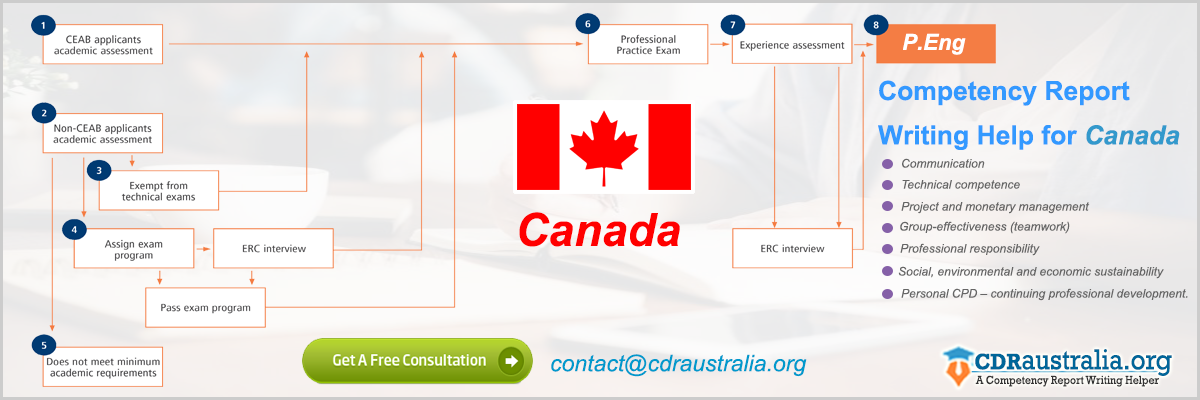The APEGBC has implemented a new application process for training engineers applying for Canada. APEGBS stands for Association of Professional Engineering and Geoscientists of BC, and P.Eng (Canada) Competency Report Writing competency assessment method is meant for defending the esteemed reputation, accountability and the expertness of the P.Eng in Canada designation.
The Engineering competency assessment writing system is formulated to make sure that APEGBC’s requirements maintain and safeguard the public interest and at the same time, keeping up a transparent, reasonable, dependable and efficient registration process.
How to Write P.Eng (Professional Engineer) Competence Assessment for British Columbia?
It is the ability to perform specific tasks and roles of an industrial type to standards anticipated and accepted by employers and the community broadly. APEGBC’s competency assessment describes in vivid detail the general competencies related to work experience that are indispensable for professional engineers to ensure successful practice and safety. Instead of writing a long work experience report in chronological order, the new competency assessment writing system requires engineers to fill out a competency self-assessment in important vital areas:
- Communication
- Technical competence
- Project and monetary management
- Group-effectiveness (teamwork)
- Professional Responsibility
- Social, environmental, and economic sustainability
- Personal CPD – continuing professional development.
APEGBC Competency Assessment Writing Help At CDRAustralia.org
An engineer using this assessment method is required to choose the best example from his/her professional work history that demonstrates a certain engineering exposure level to a particular key competency. These work examples will also necessitate validation from people who have direct knowledge of the work conducted. You can usually go for a supervisor or your colleague in that organization. If you are done with the validation of all your work examples, the assessment phase will continue to proceed, and it involves evaluators from the association going over all of the competency work examples and comments of the evaluator.
During the assessment of the competency level of a P.Eng (professional engineer) in Canada, it requires to be very clear that they have not only done well in the situations they have faced up to now, but also they have demonstrated the ability to deal with all the likely situations they may encounter in the future time. So, APEGBC Competency Assessment Writing requires applicants individuals to demonstrate their capability of applying their engineering knowledge credibly and safely in many different situations. Also, they need to stay prepared to extend their valuable support develop their understanding, and call for expert help from others. Above all, they should make out their professional limitations and act accordingly.
P.Eng (Professional Engineer) Salary in British Columbia
The average salary for professional engineers (Peng) in Canada is $30.63 per hour and $59,721 per year or.
The salary for entry-level candidates starts from $26,325 per year while experienced professionals can make up to $101,526 per annum. As usual, your pay scale increases with the increases in skills and experience.
APEGBC Competency Assessment Requirements
The competency assessment system (APEGBC) requires applicant engineers to demonstrate their engineering skills and ability to deal with many complex as well as natural situations. They are expected to provide comprehensive examples concerning their knowledge and skills, and that will let APEGBC evaluators have a clear picture of the professional engineers in Canada in all fields that are indispensable for safe and effective engineering practice.
- Competency category:
The competency assessment system comprises of seven competency Categories that are already mentioned, which are the groupings of skills and competencies. The seven categories should represent the critical areas wherein professional engineers in Canada of all engineering disciplines should demonstrate their engineering proficiencies to ensure a safe engineering practice. Every single competency category has a list of the main competencies required in that specific discipline. Professional engineers who apply should meet the fixed standards of every separate competency category to fit the entire competency requirements of APEGBC.
- Key competencies:
This category usually has a recognized knowledge base or skill set that the applicant engineer should have reached to attain professional registration. They are behavioral descriptions like what an applicant engineer should demonstrate that they have done in their professional career to meet the required competency level in each competency category. If an applicant wishes to stay ahead of the competition, he/she should meet each key competency at a minimum of degree one on the CRS (competency rating scale). This does mean that he/she achieved the required average level for every single category altogether.
- Competency level
The competency rating scale generally outlines six different levels of competence from 0 – 5 and the achievement of each group is measured with the help of this rating scale. Every single class has a required least overall competency level which is set at either second level or third level. The average of an applicant individual’s key competency scores within each category should meet or surpass the fixed minimum level. Engineers should also achieve a minimum of the first level in every single key competency.
- Indicators
These are specific examples of individual skills, actions, activities, or behaviors that an application engineer can use to exhibit the existence and attainment of a particular competency. APEGBC has provided a list of indicators for every key competency to help engineers comprehend some essential things like, what sorts of examples are required, the knowledge needed, skills they have to develop before attaining a professional registration, etc.
How Our Expert Helps in Preparing P.Eng Competence Assessment for BC, Canada
The P.Eng designation is a professional license that lets you practice the engineering profession in the county or some other country where it was granted. Only licensed engineers or engineers who are practicing under the direct administration of a professional engineer have legal rights to practice engineering in Canada. P.Eng (Canada) Competency Report Writing service help comes in handy there, and we offer you the needed help. We have knowledgeable professionals who are ready to handle all your writing issues. We at CDR Australia understand your entire case and describe the best examples of your recent engineering activities under each key competency in the finest way and help demonstrate your accomplishment of the skill. The engineering examples chosen by our expert writers will reflect projects and activities wherein you have had the entire responsibility which is entirely related to the engineering discipline you mentioned in your application. We are keen on every single detail provided by you and specific in depicting how you have met each key competency.
When choosing examples, we pay close attention to the indicators as they will help you make out typical evidence to put before. We provide you with a customized P.Eng (Canada) competency assessment report by getting your views, ideas, and messages. By hiring experts from CDR Australia consultants, not only will you get the most excellent report, but a team of friends that connect deeply.
Our Engineering Competency Report (ECR) assessment writing services will speak as per the guidelines of APEGBC- Association of Professional Engineering and Geoscientists of BC. Our writers come with many years of experience and do a lot of research before starting a competency assessment report, and the end product will be 100% original. We generally keep the instructions and requirements mentioned in the booklet guidelines while writing the report. We don’t simply write your story but sculpt it!



